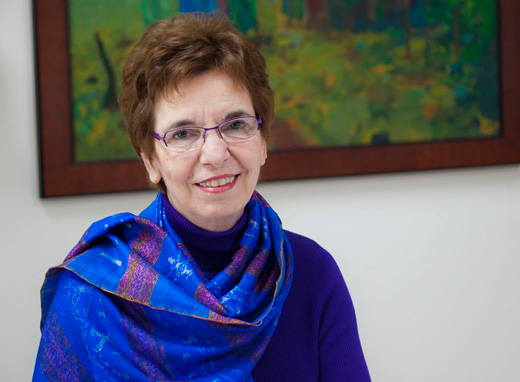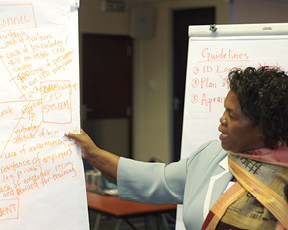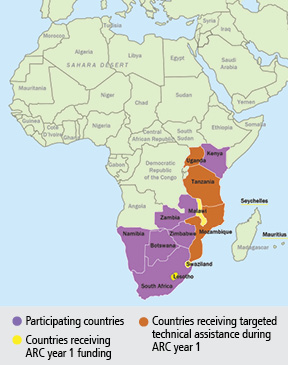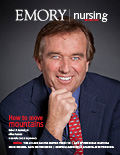ARC of Progress

Maureen Kelley leads ARC, a collaboration with African nursing leaders to better align nursing practice and education with global standards.
Nurses take charge of their regulation in sub-Saharan Africa
A little money can go a long way in the right hands. In this case, those hands belong to nursing and midwifery leaders in sub-Saharan Africa.
The Lillian Carter Center for Global Health & Social Responsibility is part of an innovative program aimed at improving health care in 14 African countries by working directly with nursing leaders to improve professional regulation and education. The African Health Profession Regulatory Collaborative for Nurses and Midwives (ARC) is a four-year collaborative project with the CDC; the East, Central, and Southern Africa Health Community (ECSA-HC); and the Commonwealth Secretariat, a voluntary association of 54 countries that work together toward shared goals.

Through ARC, nursing leaders like Glory Msibi of Swaziland are learning and sharing methods to overcome issues in practice and education. |
"We are working at a regional level with country teams to help ensure that the nursing and midwifery standards of practice for each country are aligned with global standards, that regulatory frameworks reflect current practice and education, and that issues such as task shifting and continuing professional development are addressed," says Maureen Kelley PhD CNM FACNM, Independence Chair and ARC project leader in Emory's nursing school.
Adjunct faculty member Patricia Riley MPH CNM FACNM, a health workforce expert with the CDC's Division of Global HIV/AIDS, conceived the vision for ARC. "Pat's idea was to put together a team of nursing and midwifery leaders and ask them to work together on a regulatory problem that the CDC calls a "winnable battle", " says Kelley. "Instead of telling each country what to do, we have posed the question, "In your country, around nursing and midwifery regulation, what discrete problem could you address in a year's time?" The aim was to build strong country collaboration through country-led initiatives."
Accordingly, in February 2011, ARC assembled four nursing and midwifery leaders from each of the 14 ECSA countries in Nairobi, Kenya. Leaders included the chief nursing officer (CNO), the nursing registrar, a representative from the nursing/midwifery association, and a representative from nursing education. All were divided into their specialty groups to discuss common and unique problems.
"They learned from each other about what was happening in education or regulation," says Kelley. "Then they developed a report on the most pressing issues facing their professional group."

Map of countries participating in the African Health Profession Regulatory Collaborative for Nurses and Midwives (ARC) |
Next all of the leaders reassembled as country teams charged with identifying an issue to address in their nation in a year's time. Each team then was invited to submit a grant proposal to have their project funded.
ARC selected five proposals to fund at $10,000 each in Lesotho, Swaziland, Seychelles, Mauritius, and Malawi. The country teams moved forward using a model based on the Institute for Healthcare Improvement Design for Rapid Change. The five teams implemented their projects in country and reconvened twice for learning sessions led by ARC. During these sessions, the groups also shared their experiences and knowledge, fueling what Kelley calls 'south-to-south" collaboration, or learning from each other.
In February 2012, representatives from all 14 countries met again to hear leaders from funded countries share their experiences. Leaders from all of the countries then were invited to submit grant applications for the next round of funding—a process that will continue annually for the next three years.
The effectiveness of ARC's approach can be seen in the remarkable progress made in the first five countries. Consider Swaziland and Lesotho, where country teams identified continuing professional development (CPD) for nurses and midwives as an area to address.
"Both countries had almost no CPD," says Jessica Gross 07N 09MSN/MPH, a public health consultant with the African Health Professional Regulatory Collaborative. "Within just seven months, they developed a framework to specify what constitutes CDP, what type of activities will be included, how nurses can access those activities, how those activities will be monitored and logged, and how many activities nurses need to renew their licenses. Leaders involved nurses every step of the way, soliciting their ideas and options, so they will have buy-in when CPD is implemented. It's amazing how far they've come in such a short period of time."
Kelley and her team believe the momentum created during ARC's first year will continue. One positive outcome has been the formation of a unified group among the four nursing leaders in each country.
"This is a group of people who might not have even talked to each other before, and now they have come together as a cohesive unit," says Kelley. "They have even given themselves a name—they call themselves "The Quad." Many now meet monthly to discuss issues and brainstorm solutions."
The Quads now are well versed in the fine art of grant application and management. Each was required to write and submit a grant proposal—a new experience for most, if not all—and prepare a budget and quarterly reports.
"Almost all of the development money flowing into sub-Saharan Africa goes to nongovernmental or bilateral organizations, which partner with local leaders. But the money rarely makes it to the leaders on the ground," says Gross. "By directly awarding money to the country teams, national leaders can develop a track record for fiscal management, which in turn can help them approach local donors for future funding."
Getting the money directly and deciding which issues to tackle have empowered and motivated the leaders. "In the world of grants, $10,000 isn't much money," says Gross. "But it's amazing what these country teams have been able to do with it."
Jill Iliffe, executive secretary of the Commonwealth Nurses Federation and an ARC faculty member concurs. "The ARC initiative is one of the most successful I have encountered, delivering outcomes that are truly of value to the countries in which you are working."—Martha Nolan McKenzie


